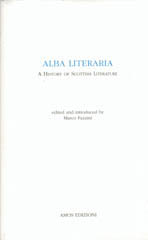Marco Fazzini
An International Angle
 The Alba Literaria represents something of a landmark contribution to the growing number of critical histories of ‘Scottish literary production’. Though extending to more than 800 pages, this surprisingly compact publication consists of forty-eight essays on single authors or single aspects of Scottish literature, from the earliest epic poems and chronicles to new Scottish poetry, drama and fiction-writing.
The Alba Literaria represents something of a landmark contribution to the growing number of critical histories of ‘Scottish literary production’. Though extending to more than 800 pages, this surprisingly compact publication consists of forty-eight essays on single authors or single aspects of Scottish literature, from the earliest epic poems and chronicles to new Scottish poetry, drama and fiction-writing.
The approach taken towards establishing a new understanding of Scottish literary production over the past seven hundred years is heavily theoretical and is based on post-modern critical theory. Each contribution focuses on some of the key works or key authors of Scottish literary history, but restricts itself to one or two aspects of the work or author under consideration. In his introduction, Fazzini suggests that this ‘partial’ treatment better permits a representation of ‘the core problems attached to a ”minor” and ”colonised” country such as Scotland’ and attempts to offer ‘a decentred discussion of the Scottish canon’, demonstrating the possibilities of ‘counter-discursive or post-colonial’ readings. Alba Literaria proposes ‘a redefinition of the Scottish canon’, relocating and subverting the old centre, thus ‘making new centres out of old peripheries’. The resulting analyses of what Fazzini calls ‘the fracture zones where the canon and its linearity is questioned and subverted’ illustrate some of those ‘problems’ associated with literary production within Scotland as a ‘minor’ and ‘colonised’ country – the loss of national identity, the manifold contradictions linked to Scotland’s multi-linguistic reality, the psychic and cultural anxiety determined by its marginalisation, the tragedy of the Scottish Clearances and diaspora, the contaminations and divergences between the Scottish and the English canons, the role played, across the centuries, by translation – a powerful ‘tool of literary and intellectual struggle’ – and the too often suppressed world of women’s literature and that of oral production.
The essays place Scotland within the general discussion about ‘peripheral literatures’ written in English and also seek to demonstrate how the emergence of ‘new and subversive’ voices within these ‘literatures in English’ has resulted in the rejection of ‘imperial discourse’. Fazzini argues that it is still a controversial matter if writers such as Byron or Carlyle ‘have any right to appear with such a literary and national label’ or whether minority writing within an already marginalised tradition ‘can face the high water results of Scott’s prose, or of Burns’ composition written with musical and poetic aims’.
Alba Literaria opens with Tom Hubbard’s’ very brief essay on ‘Michael the Wandering Scot’, which introduces the idea of the Scottish literary ‘diaspora’, or as Hubbard puts it, more plainly and neatly, ‘the wandering Scot’ – the phenomenon of those Scottish writers who ‘lived and worked overseas… the earliest celebrated literary example’ of which ‘bears his name in his surname’. Scot – one of the greatest polymaths of mediaeval Europe – was a prolific translator whose own work was also much translated. To echo what Fazzini expresses in his Introduction, translation – viewed theoretically – can ‘cross the borders of national and cultural exclusivity’ and so can help the ‘attainment of awareness of multiculturalism… responding to the call of a kind of elective affinity and refusing the authority of the standardised language and the canonised prescriptions imposed by the centre’.
©Michael Lister
Ed. Marco Fazzini. Alba Literaria: a History of Scottish Literature. Amos Edizioni. ISBN 978 88 87670 12 7.

Comments